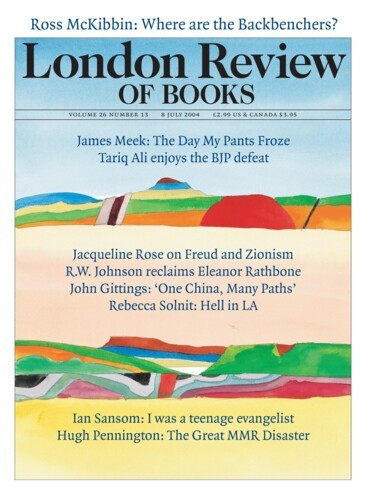‘It’s my feeling that she looked forward to her tomorrows,’ said Marilyn’s housekeeper, the last person to see her alive. But now we may be in a position to say that Marilyn Monroe’s tomorrows have stretched beyond any known horizon, becoming one of the publishing world’s core subjects. More than six hundred books have been produced about the late movie star; that’s more books than you’ll find on Florence Nightingale, Princess Diana, Boadicea and Julia Roberts put together. So what kind of story is a story that can never be told enough?
Books and plays about Marilyn Monroe are so widespread that writing one might soon be considered part of the entrance exam for college in America. Isn’t it part of Marilyn’s contribution to the understanding of modern selfhood that everyone might be thought to have a Marilyn book in them? You’d certainly think so if you look at the list of people who’ve given it a go: her New York maid (Lena Pepitone), two of her husbands (James Dougherty, Arthur Miller), her half-sister (Berniece Miracle), her stalkers (Robert Slatzer, James Haspiel), her saviours (Gloria Steinem, Kate Millett), her driver of one summer (Colin Clark), her coroner (Thomas Noguchi), to say nothing of half a dozen big novelists and enough conspiracy hacks to fill a jumbo jet.
In some cases (usually academic) the more books written about a subject the more have to be written, as the subject’s afterlife increasingly proves to be the more real and the more insistent topic. That is not only true of Marilyn – whose original personhood, you might say, is lost for ever under the weight of her posthumous existence – but books about books can now show themselves to have a life less ordinary than the thing the books were first about.
Marilyn’s life is certainly more textual than sexual nowadays: more than that of any artist one can think of, her life has given itself to endless written disputes about the scope of fiction and the meaning of reality, so it was only a matter of time before someone set out to tell the story of Marilyn’s stories. ‘The myth of Marilyn Monroe derives from the peculiarities of these accounts,’ Sarah Churchwell writes in The Many Lives of Marilyn Monroe (Granta, £18.99). ‘Their dubious authenticity, their attempts to establish a truth about a mythical figure, their propensity for espousing cultural dogma (and for being sanctimonious while they’re at it), their tendency toward the collective and the aggregate: all of these make the writings about Marilyn Monroe an apocrypha, which is how I will often refer to them.’
Churchwell teaches American literature and culture at the University of East Anglia – the place also famous for the teaching of fiction – and I can’t help asking if anyone has thought of making her the Professor of Facts About Fiction, or something like that, just to balance up the act in Norwich. In her book she turns out to be especially harsh about people making things up, especially if they happen to be Joyce Carol Oates or Norman Mailer, fiction writers who have shown an interest in making up the life of Marilyn Monroe. One could go on all day like this, and people do, which is why Churchwell’s book turns out to be a new sort of literary pot-boiler, where the reader steams ahead in the hope of finding out not whodunnit, or whosaidit, or even whowasshe, but something more like whowasn’tshe.
The journey towards who a famous dead person wasn’t is a tricksy kind of exploration, and much welcomed at this desk. But what happens as time goes by and new lies appear? Can you always be sure that a person isn’t who you think she isn’t? Some people just happen to have been very good at appearing not as they are, which may be one of the reasons Marilyn Monroe became such a saint of modern culture in the first place. But maybe – just to run with the hare and the hounds for a second – we are asked to be more interested in the story of the story than in the story itself for simpler reasons. Maybe it’s just what Damon Runyon would call a new new angle. Because once everything’s been said about a subject what is left for new writers but the pleasure of unsaying it all?
Churchwell’s book isn’t the story of a girl’s life: it’s the story of a mass audience and its fantasies, and we have come to the point where that is perhaps the best and most appropriate sort of book that can be written about a figure like Marilyn Monroe. Yet, like many things postmodern, such books, while estimable in themselves, can leave the reader with a sort of humanist jetlag. ‘Suicide implies an authorship with one’s own life,’ the cultural theorist Elisabeth Bronfen wrote. ‘In theory this may be true,’ Churchwell replies, ‘but in practice Marilyn Monroe’s suicide hardly released her from the determination of others; it fixed her for ever within their interpretations. She became not author, but character, much more surely than while she lived, when she could attempt, with however limited an effect, to resist the interpretations of others.’
There’s the problem. Afterlives are not more interesting than lives: they are just more ongoing, and they can seem more significant to generations with a developed taste for unreality. But we might continue to ask if a famous person can be thought to have had a life before the matter of that life’s interpretation – and there are sure to be a few hundred books along in a minute to say yes and no.
Send Letters To:
The Editor
London Review of Books,
28 Little Russell Street
London, WC1A 2HN
letters@lrb.co.uk
Please include name, address, and a telephone number.

